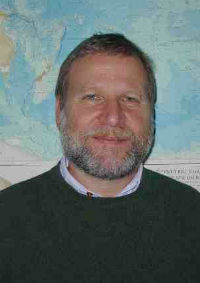Ehemaliger Prof. Dr. Heinrich Villinger
Der Schwerpunkt unserer ForschungsaktivitÃĪten liegt auf der Messung des terrestrischen WÃĪrmestromes am Meeresboden und der Entwicklung von Instrumenten zur Langzeitbeobachtung physikalischer Prozesse in der Tiefsee. Marine WÃĪrmestromdichtemessungen werden zur Erkundung der Temperaturstruktur von Sedimentpaketen eingesetzt, um z.B. den Einfluss von Seamounts auf die hydrothermale Zirkulation in der ozeanischen Kruste abzuschÃĪtzen. Mit Langzeitregistrierungen von Temperatur, Druck und Neigung untersuchen wir tektonisch oder magmatisch verursachte Meeresbodendeformationen an mittelozeanischen RÞcken, die AktivitÃĪt submariner Schlammvulkane und Hydrothermalfelder, sowie Prozesse in gashydratfÞhrenden Sedimenten. Auf dem Gebiet der Offshore Windparks engagieren wir uns mit Bodenfestigkeits- und WÃĪrmeleitfÃĪhigkeitsmessungen fÞr Kabeltrassen.
Arbeitsgebiete
Mittelozeanische RÞcken, KontinentalrÃĪnder, kalte und heiÃe Quellen am Meeresboden, Nord- und OstseeMethoden
WÃĪrmestromdichtebestimmungen, ROV-gestÞtzte Messungen, TiefseeobservatorienProf. Dr. Heinrich Villinger

1976 Diplom in Geophysik, TU Berlin; 1983 Promotion in Geo-physik, TU Berlin
Anstellungen:
1977-83 Institut fÞr Angewandte Geophysik, TU Berlin; 1983-85 Pacific Geoscience Centre, Sidney, BC, Kanada; 1985-92 Alfred-Wegener-Institut Bremerhaven
Professor in Bremen 1992-2016
Forschungsgebiete:
Marine Geophysik, Schwerpunkt marine Geothermik, Instrumen-tenentwicklung fÞr den Einsatz in der Tiefsee, Tiefseeobservatorien
Tel. +49 421 218 - 65340
vill uni-bremen.de
uni-bremen.de
Fachbereich Geowissenschaften
der UniversitÃĪt Bremen
GEO GebÃĪude / Raumnr. 5090Klagenfurter StraÃe 2-4
28359 Bremen
Prof. Dr. Heinrich Villinger

Fachbereich Geowissenschaften
der UniversitÃĪt Bremen
Klagenfurter StraÃe 2-4
28359 Bremen
Tel. +49 421 218 - 65340
vill uni-bremen.de
uni-bremen.de
der UniversitÃĪt Bremen
Klagenfurter StraÃe 2-4
28359 Bremen
Tel. +49 421 218 - 65340
vill
 uni-bremen.de
uni-bremen.deLebenslauf
1976 Diplom in Geophysik, TU Berlin; 1983 Promotion in Geo-physik, TU BerlinAnstellungen:
1977-83 Institut fÞr Angewandte Geophysik, TU Berlin; 1983-85 Pacific Geoscience Centre, Sidney, BC, Kanada; 1985-92 Alfred-Wegener-Institut Bremerhaven
Professor in Bremen 1992-2016
Forschungsgebiete:
Marine Geophysik, Schwerpunkt marine Geothermik, Instrumen-tenentwicklung fÞr den Einsatz in der Tiefsee, Tiefseeobservatorien
vill
 uni-bremen.de
uni-bremen.de
